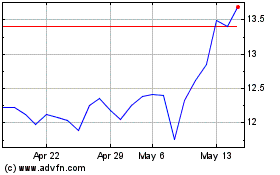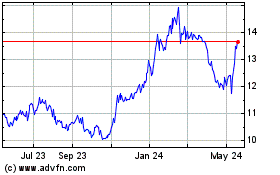Tencent Aims to Expand in U.S. -- WSJ
November 11 2019 - 2:02AM
Dow Jones News
Nintendo tie-up is key to an effort to make more console games
for Americans
By Takashi Mochizuki in Tokyo and Shan Li in Beijing
This article is being republished as part of our daily
reproduction of WSJ.com articles that also appeared in the U.S.
print edition of The Wall Street Journal (November 11, 2019).
China's Tencent Holdings Ltd., the world's largest videogame
company by revenue, is looking to make more console games for U.S.
consumers by leveraging its partnership with Japan's Nintendo Co.,
Tencent officials said.
Tencent, which dominates its home market with smartphone and
personal-computer games, has acquired stakes in prominent U.S. game
makers including Epic Games, creator of the hit "Fortnite," and
Activision Blizzard Inc., publisher of the shoot-'em-up game "Call
of Duty." But the Chinese company doesn't yet have a significant
direct presence in U.S. console games.
The U.S. videogame market is a prime target for growth,
especially because China has begun putting limits on games,
including a curfew for players under 18, blocking them from playing
late at night.
"What we want is to expand from China, and one target is console
game players in the U.S. and Europe," said a Tencent official, who
asked not to be identified. "We hope to create console games with
Nintendo characters, and learn the essence of making console games
from Nintendo engineers."
The Tencent-Nintendo partnership led Nintendo shares to rise 14%
when it was announced in April because investors thought it would
give Nintendo greater access to China's huge game-playing
population. Tencent said it would help Nintendo sell its Switch
consoles in China. Analysts say the partnership could also allow
Tencent to distribute smartphone games using Nintendo characters in
China.
The partnership is off to a slow start, though, because of
delays among regulators in China, who must clear both game consoles
and software.
Both companies are cautious about Nintendo business in China.
Tencent officials said they didn't believe the Switch would sell in
China as well as it has in the U.S. and Japan, because Chinese
customers are more accustomed to playing games on smartphones and
PCs.
As a part of its deal with Nintendo, Tencent promised the
Kyoto-based company it could sell at least a few million units of
the console in China throughout the machine's lifecycle, Tencent
officials said. That is a modest goal: The Switch sold more than a
million units in the U.S. during the July-September quarter
alone.
On the software side, analysts said Chinese smartphone users
might jump at the chance to play games with Nintendo characters
such as Mario the plumber, if Nintendo and Tencent can work out
terms for a distribution deal. Tencent officials, however, said
that wasn't their focus because Tencent already dominates the
Chinese market with its own games. "Nintendo games are not
constructed to make people pay a lot of money," another Tencent
official said.
Nintendo Chief Executive Shuntaro Furukawa has adopted the same
view as Tencent, telling analysts that they shouldn't expect a lot
from the Switch in China.
Nonetheless, Nintendo sees some potential to expand its
audience. Outside developers said they were asked by Nintendo to
make games for young women, such as romance games, a genre with
passionate fans including in China.
"Women are becoming a driving force behind the growth of the
gaming market," said Daniel Ahmad, an analyst at Niko Partners, an
Asia-focused games analytics company. "Chinese developers are not
only shifting to create games aimed at female players, they are
also tailoring existing games to better appeal to them."
Lisa Cosmas Hanson, managing partner at Niko Partners, said
while she didn't see console game development for the U.S. as a
priority for Tencent, she thought the move could give it an
observation post on the tastes of U.S. gamers.
"Tencent is skillfully pursuing silent global domination, via
expansion primarily in the form of major and minor investments in
[videogame] industry companies around the world without rebranding
them as Tencent," Ms. Hanson said.
For Tencent, the greater, though intangible, advantage of the
Nintendo tie-up may be the ability to learn from the Japanese
company, which has a knack for winning over U.S. game players.
Tencent tried the U.S. market two years ago with a smartphone game
called "Honor of Kings" that has drawn tens of millions of Chinese
players; rebranded "Arena of Valor" for Americans, it barely made a
dent.
Tencent officials say the learning will take time and that they
sometimes have trouble trying to decode messages from the Kyoto
company. Nintendo declined to comment.
Write to Takashi Mochizuki at takashi.mochizuki@wsj.com and Shan
Li at shan.li@wsj.com
(END) Dow Jones Newswires
November 11, 2019 02:47 ET (07:47 GMT)
Copyright (c) 2019 Dow Jones & Company, Inc.
Nintendo (PK) (USOTC:NTDOY)
Historical Stock Chart
From Feb 2025 to Mar 2025

Nintendo (PK) (USOTC:NTDOY)
Historical Stock Chart
From Mar 2024 to Mar 2025
